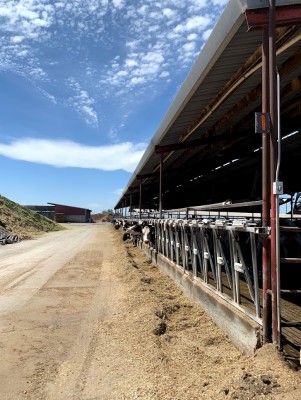Five high-impact actions can reduce injuries - Hoard`s Dairyman Intel

Five high-impact actions can reduce injuries - Hoard`s Dairyman Intel
by John Shutske, University of Wisconsin-Madison
To access the original article, click here
With spring just around the corner, and a reminder that the risk for severe injury being almost seven-times greater on farms than all other types of businesses, here are some important, high-impact things that our research shows will reduce risk.
1. Spend time formulating a workplace safety and health policy. Here is a Template that can be used on any type of farm. A policy is a starting point for a more comprehensive safety "program." The policy spells out your farm's values, expectations, and specific practices that you want to prioritize. Ideally, a safety policy, whether for a small family farm or large operation with 20 or 30 employees, is developed with input from all who are covered by it.
2. Upgrade marking and lights on ALL highway-operated farm equipment. Most often, when people think about farm injuries . . . we are hesitant to say 'accidents' because these incidents are highly preventable . . . they think of tractor rollovers, power take-off (PTO) entanglements, and other traumatic scenes. But our ongoing research shows that many deaths associated with farms happen on the highway. And, unfortunately, this is an issue that also is of broader public concern. Become familiar with state and federal regulations and standards. New federal laws require upgraded lighting and marking that is more stringent than most state regulations. Areas to focus on include a bright, clearly visible, clean slow-moving vehicle (SMV) emblem, flashing amber lights that are bright and visible at all times (even in daylight hours), and turn signals.
3. Communicate often with your employees about safety. My research during pandemic times has shown that workers care about their health. And they notice the actions or inactions that relate to their safety and well-being. This includes informal training, farm "newsletters" that can be sent out by email or text message, and regular conversations.
4. Make personal protective equipment readily accessible. So many expensive farm injuries involve hazards that can affect a worker's eyes, lungs, feet, and hands. Quality personal protective equipment (PPE) puts a barrier between the hazard and worker. For hazards where PPE is required, you should be providing it for your workforce — but more importantly, it is important to be clear and consistent with your expectations on the use, care, storage, and so forth of PPE.
5. Be thoughtful and strategic on scheduling. Of all the farm injury studies that I have helped lead in the last 30 years, "hours worked per week" is a clear risk factor. Excessively long hours do dramatically increase injury risk. It's a difficult issue with the labor shortage we face. But know that days off or even partial days and purposeful "breaks" during a workday serve to reduce fatigue and will reduce safety risks.
Upcoming Events
Boots in the Barn: Cornell Dairy Research Updates
January 13, 2026
January 20, 2026
January 27, 2026
February 3, 2026
February 10, 2026
February 17, 2026
February 24, 2026
Join us for some or all!
Advanced Hoof Health Program
January 15, 2026
Belfast, NY
Who should attend?
- Professional hoof trimmers
- Dairy farm owners or managers in charge of farm foot health
Topics include:
- How to Create a Strategic Trimming Program for your Dairy
- The Latest in Lameness Technology for the Dairy Industry
- Housing and Flooring Design: Its Role in Hoof Care
NY Pork Producers Connection Breakfast - Geneseo
January 17, 2026 : Pork Producers Connection Breakfast - Geneseo
Geneseo, NY
All pork producers are invited to join the New York Pork Producers for a free hot farmer's breakfast, at which they'll catch up on topics including the pork to dairy barn conversion series, NYPP digital campaigns, and 840-RFID tags.
Announcements
No announcements at this time.





